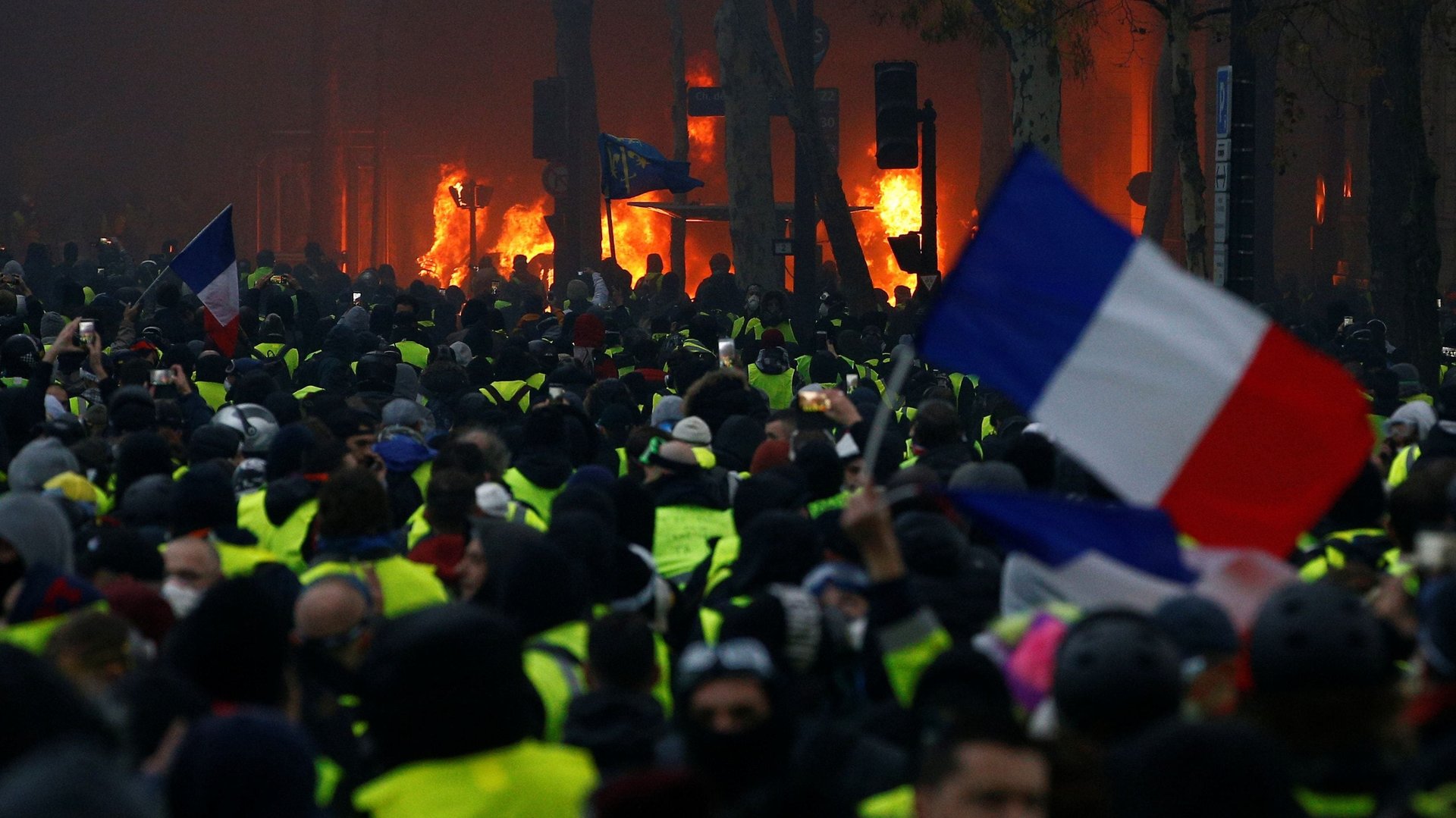What it’s like inside France’s Yellow Vest protests
For weeks, so-called “Yellow Vest” protests have spread across France. Sparked by a proposed fuel price hike (which was quickly abandoned), the leaderless protests have revealed deep discontent: French people are fed up with the disconnect between themselves and the succession of governments and political parties. We are fed up with a state that seems to exist only for the benefit of the wealthy, the established, and elite. More than fuel prices, the Yellow Vests are now defending their dignity and insisting on a new social and fiscal agenda through demonstrations, slogans and rocks.


For weeks, so-called “Yellow Vest” protests have spread across France. Sparked by a proposed fuel price hike (which was quickly abandoned), the leaderless protests have revealed deep discontent: French people are fed up with the disconnect between themselves and the succession of governments and political parties. We are fed up with a state that seems to exist only for the benefit of the wealthy, the established, and elite. More than fuel prices, the Yellow Vests are now defending their dignity and insisting on a new social and fiscal agenda through demonstrations, slogans and rocks.
At a Dec. 8 protest in Dijon, one Yellow Vest shouts into a microphone: “No contact with the [riot police], no violence. It discredits us, that’s why there are fewer people!” Others shut him down angrily, meanly. “Shut up,” says one protestor. “Everyone does as he wants!”
Without any clear direction or signal, the crowd starts moving, chanting slogans, insulting president Emmanuel Macron. We move forward without knowing where we were going, what we were looking for, or what to do. Our yellow vests are a symbol of grievance, demand, encouragement. They speak of an out-of-touch president, of those who gorge themselves on the country’s wealth, and of the few euros that remain in the hands of a nurse, a soldier, or shopkeeper. Confronted by the police vans and their helmeted troops, protestors chant “You too, are treated like dogs, you deserve better too.”
But as the police prevent the march from reaching city hall, frustration mounts. “Dirty rats, look at the cop, the dirty scab, he wanted to put on a yellow vest! Come on then, friend, come on!” Everyone mocks one small man, a supposed undercover cop, who slinks away.
When a gap opens in one blockade, the crowd streams through to the city center. Shoppers scatter at the Galeries Lafayette department store, the luxury boutiques, and the Place de la Libération, as the Marseillaise echoes on the storefronts. The day has finally begun. “Macron, resign! Macron, resignation!” the Yellow Vests shout. The march has swelled with people from all walks of life, intoxicated with their own power and the mulled wine sold along the street. Six thousand people are here, regional television will later report.
When we return again to the metal barricade that blocks access to the city hall, it is early evening. The police have gathered their vans and troops. One of them, speaking into a megaphone, asks the crowd to disperse. Some respond with projectiles. Tear gas begins to rain from the sky, and the people retreat, their eyes full of tears, before rushing in again with more songs, slogans and projectiles. Tear gas rains down again. And so on.
My dad writes to me, and so do people from other countries. “What’s going on?” they ask. I tell myself that I’ll tell them later.
Just as the police deliver a huge salvo of tear gas at the demonstrators, these women and men erupt in a full-throated rendition of the Marseillaise with those famous verses: “Citizens, to arms! Form your battalions!” The Yellow Vests link arms. A young woman distributes saline to those whose eyes are on fire. A man hands out small cardboard facemasks to those who are coughing.
In the middle of the two forces, a fire is burning. A man walks with a small white flag. He staggers, a little drunk. The police spokesman speaks through a megaphone. But the songs and the sirens make his speech completely inaudible.
Suddenly hail of tear gas grenades falls upon us. The street fills with a toxic haze. My friend Arthur and I run, burning inside. When I turn around, Arthur is no longer there. I see someone crying. My throat seizes.
Forced back into Place de la République, where the march first began, the Yellow Vests scatter between a Ferris wheel, the Christmas market and the ice rink. I am looking for Arthur. A girl costumed as Pikachu is trying to stop kids from pelting police with pebbles. I cannot find Arthur, his phone does not answer. The police have advanced, and I cannot go back to look for him.
I keep looking, wandering under the lampposts, amid the din, 10 yards away from the shields and the truncheons. The crowd is still there, shouting at the police. “Bunch of assholes, aren’t you tired of being Macron’s whores?”
My phone rings: Arthur has taken refuge at a restaurant, the Boeuf Blanc. “Wait for me, I’ll join you,” I say. With a sudden explosion, another volley of tear gas floods the square.
When I finally find Arthur, we head toward my house, avoiding grenade shells, broken bottles and stones in our path. The further we go, the fewer neon vests we see, and the city regains its normalcy—for now.
Macron has not given us a better world. But reviled as he is by the Yellow Vests, he has brought a certain romance back into the lives of ordinary people: the thrill of waking up in the morning ready to invent a better world ourselves.